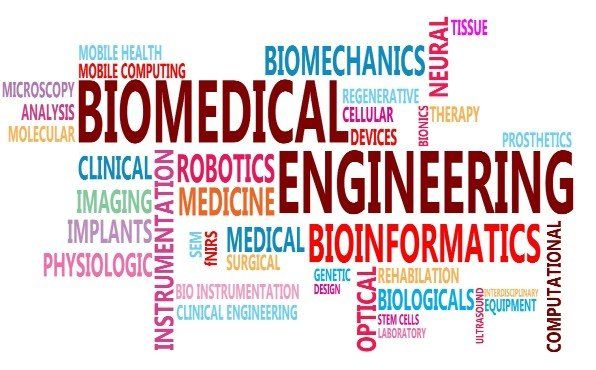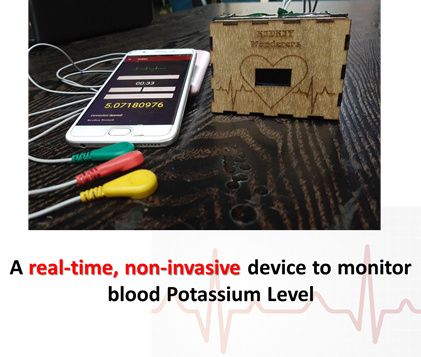Hi Everyone,
In this article I want to share the experience of my team (Wanderers) and myself in our first medical related project. From the time I selected biomedical engineering, I was looking forward to do projects in the areas covered under biomedical engineering. In the beginning I lacked knowledge about the technologies and various aspects covered by Biomedical engineering.
To be honest I am now fascinated about the areas covered that comes under biomedical engineering not only medical instrumentation but such as genomic engineering, bioinformatics, medical imaging, digital health, soft robotics, bio signal processing, neural engineering and the list goes on.

COVID 19 pandemic has made everyone understand the need of research and innovations in healthcare to face and overcome these situations. Along with the doctors currently there are many researches and projects going on around the country to support the health staff in the fight against this pandemic. This shows the importance of biomedical engineering and innovations in the healthcare industry. Biomedical engineering is a rising field in the world and is new to our country. As undergraduates it is our responsibility to create innovations and work on projects that solve problems related to healthcare. It is the best way to gain recognition and fame to our department and to our profession.
Firstly, as an engineering undergraduate we should understand that our perspective differs from medical students and doctors. They are more aware of the problems existing in healthcare sector than us. But we have a better view related to solution and its implementation using the technology. So, a good connection with the medical community is utmost important for us to succeed as a Biomedical engineer.
During our semester 3 holidays we had a collaboration with Centre for Biomedical Innovation (CEBI), where my batch of biomedical undergraduates did an Observation study on hospital patient management system. During this internship we got the opportunity to visit various units in the hospital and gained knowledge about the systems and machines used in the units. During the internship visiting physician of the dialysis unit addressed us with a problem. The problem was that they were unable to monitor the blood potassium level of the patients during the dialysis treatment. Currently it is done by doing a blood test before and after dialysis which is a time consuming and painful method. So, a solution which involves real time monitoring of blood potassium level in a non-invasive approach was required.
We did both the background check and literature review related to this problem, to find a feasible solution. We had several ideas in our mind to solve this problem. During that time, we applied to HackX 2019 which was organized by University of Kelaniya. Out of 160+ teams we were selected to the semifinals where we pitched our idea. We got selected to the top 13 teams out of 30 teams who pitched their innovations at the semifinals. That’s where we started to face many issues because converting an idea to a working prototype is really challenging. Following are the main challenges we faced during prototyping:
- There aren’t any available data sets which can be used for our solutions.
- A user-friendly implementation was needed to hide the complexity of the solution
- An architecture for implementation.
- The lack of knowledge in this domain.
- One-month time period to implement the solution to present at the finals.

We never gave up on our efforts, as a team we worked together to overcome these challenges and only advantage we had was the non- academic staff strike. We visited Panadura Base hospital 5 days per week until three days before the finals to collect necessary data from the dialysis unit. I would like to thank the doctor in the dialysis unit, since without his support we wouldn’t be able to get the necessary data. With parallel to data collection we started learning and working on Sensing the signal, bio signal processing, IoT implementation, Feature Extraction, App development, Machine learning and prototype designing.
We gained great support from our Biomedical lecturer Dr. Anjula Desilva, who spent his valuable time in enlightening us with the concepts in bio signal processing and clearing our doubts related to the problems we faced in our approach.
The day came, our countless efforts and sleepless nights were rewarded on that day, where we emerged as Runners up at HackX 2019, being the only biomedical project in the finals. Later we went on to win hackathons such as SLIOT, BRAINSTORM, IEEE Innovation Nation and MORAVENTURES. It was a great experience and we were blessed with the best team. We gained a lot of insights from the professionals in the industry through these hackathons which helped us a lot.

The team behind this success consists of Jonaththan Johnny (ENTC, IoT implementation), Vinith (BME, Electronics and Business analyst), Mithunjha (BME, Machine learning), Thuvarahan (CSE, Mobile App Development), Kaushalya (BME, Enclosure design) and me (BME, Bio signal processing, Feature extraction and PCB design). Innovating and prototyping a new idea in medical field is challenging but not as challenging as converting it to a final product to reach the market. Also, the path of a medical product reaching the market is more challenging than any other products, because it must go through many testing and approvals. I will share the knowledge gained from the professionals in industry related to this in a different article. See you then.
SUMMARY
A quick guide, tips and tricks in getting started with your biomedical project.
- Have a good bond with the medical community. (VERY IMPORTANT)
- Do researches to identify the problems in health care.
- Carry out literature review and come up with variety of solutions for an identified problem.
- Brainstorm and select the most feasible one. Remember you must think in the perspective of the end user as well.
- Do a market research as well to learn about competitor products.
- Create an architecture for implementation.
- Get insights from the lecturers and seniors. ( This really helped us in our progress)
- Create a prototype to Validate your idea. Validation is utmost important to move forward.
- Make your project unique.
#CHEERS
#BIOMEDICAL ENGINEERING
